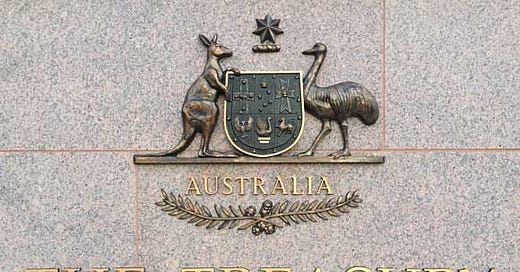
Taxation Dysfunction
We’re all familiar with the dictum, “In this world nothing is certain but death and taxes.” But Will Rogers also astutely observed, “Yes, and the only difference between death and taxes is that death doesn’t get worse every time parliament sits!”
The first thing to say about taxation is that we need less of it, not more.
Last week’s budget made it clear the government does not have a revenue problem – soaring iron ore, coal and natural gas prices are set to add $58 billion to tax revenue over the next four years. However, it does have a spending problem, with deficits predicted from here to eternity.
To address this, economists, businesspeople and, of course, State treasurers, kicked off the debate by proposing to raise and/or broaden the GST. Economic considerations aside, why the Commonwealth would even consider such a proposal is laughable. The Federal Government would bear all the pain and the States would enjoy all the gain – which they would no doubt spend as extravagantly as they do with existing GST proceeds.
Aside from the political reason, there is the simple economic reason: a lift in the GST rate, or a base-broadening change, would simply give State governments more of our money.
Treasury officials, economists and business people will of course respond by saying they are not looking to raise more revenue, they just want to raise more from the GST and then offset that by reducing other taxes. But as occurred when the GST was originally introduced, by the time you have compensated everybody who says they will be worse off, you are left with only a portion of what the GST increase will raise. The result, as it was in 2001, would be a higher level of expenditure, a higher level of taxation, and no reduction in other taxes. This has been the experience with consumption taxes around the world.
It goes without saying that attempts at tax reform in Australia in the past have been disappointing. The introduction of the Goods and Services Tax in 2000 resulted in a big increase in tax revenue – it will generate $80bn this year – a sum that was beyond the wildest imagination of even its most enthusiastic proponents back then. Getting the States to abolish many of their taxes, as they had promised to do as part of the GST introduction package, has, to say the very least, been problematic.
One of the main problems is the fact that 70% of local, State and Federal taxes are spent on salaries. It’s no wonder we haven’t seen a new reservoir built in 50 years. And of that 70%, less than half is spent on essential services like nurses, teachers and police. As we know, whenever cuts in government spending are called for, politicians respond with “well how many nurses, teachers and police would you like us to cut?” They rarely ask how many media advisers you would like them to cut.
Presently, the Commonwealth raises around 80% of all taxation revenue in Australia, leaving the States with just 20% to fund their responsibilities. That 20% is less than half the revenue needed to fund State Government services. The balance comes from Commonwealth grants, many of which have conditions attached.
Fairly obviously, federal fiscal arrangements are dysfunctional.
As for tax law, the sheer quantity and ever-changing content of tax legislation has undermined its credibility.
One leading tax barrister described Australia’s tax laws as ‘unintelligible’.
It is practically impossible to know what the law is and what it means., and the High Court now seldom grants leave to appeal in federal tax cases, virtually giving up hope of ensuring the tax system remains subject to legal principles and normal adjudication methods.
Before the First Uniform Tax Case in 1942 the legislation occupied just 81 pages. It is now over 10,000 pages, (20,000 if you include fringe benefits tax, capital gains tax and superannuation provisions). If that’s not a recipe for dysfunction, it’s hard to know what is.













